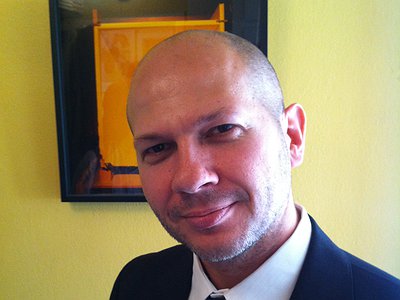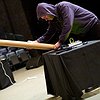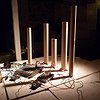When did you start playing your instrument, and what or who were your early passions or influences?
I started playing music at the age of 12 years old. Initially I played classical guitar. The first musical impact on my life was Luis Alberto Spinetta, an Argentinian song writer who passed away a few months ago. I keep on listening to his music like in those days. He is a main source of beauty and musical pleasure to me. As a teenager I studied classical music at the Conservatory and jazz with private teachers. Right after the first impact with Spinetta, as a teenager, I was impressed by bandoneón player Dino Saluzzi. As he started recording for the label ECM I began to listen to several musicians involved with that label. Among them, The Hilliard Ensemble versions of Perotin and Gesualdo introduced me to Medieval, Renaissance and early Baroque music, that remains a fundamental influence on me now. Miles Davis was also someone that I was listening to a lot, mainly Kind of Blue, Blue Moods, the 50´s and 60´s quintets. When I was 20 I began to play soprano saxophone and a bit later the bass clarinet. These instruments became my main instruments and I stopped playing the guitar. In those years I was listening to Louis Scalvis (The albums Rouge and Acoustic Quartet) and Tim Berne (his three albums recorded live at Instants Chavirés), Julius Hemphill (Reflections) and Anthony Braxton (his quartet with Marilyn Crispell, Jerry Hemingway and Mark Dresser).
My music development was determined by the information that I could grab in those days in Argentina. Since the age of 18 I had worked as a music teacher in schools. In the 90´s Argentina had a strange law that destroyed it´s economy. The law established that one Argentinian peso had the same value of one dollar. This allowed me to save money with international value. In 1997 I took lessons with Sclavis in Lyon, that he offered me for free. I found a work in a hostel and stayed longer in France, listening to several musicians. I listened live to Evan Parker, Steve Lacy, Voice Crack with Günter Müller, Jacques Di Donato and Xavier Charles, for example. And that was a nice impact. I was listening also to indie rock, Sonic Youth, Pixies, My Bloody Valentine, Living Colour. Also Bjork (Homogenic) and Portishead. I found and listened in a public library, for the first time, music by Morton Feldman and Giacinto Scelsi. Then I went back to Argentina. Played with my friends, and saved some money. I got in touch with the music of composers Helmut Lachenmann, Luigi Nono and Mathias Spahlinger .
In 2000 I went to New York, where I could meet several musicians who had played with Braxton and Hemphill, and attended many concerts of the downtown music scene. I listened live to Derek Bailey several times. I perceived the social roots of jazz and its differences with my own history. I got in touch with several beautiful CD´s by the collection World Music Library, getting impressed specially by Gagaku, other traditional Japanese music, music from Korea and Gamelan. I listened to some Spectral music (Gerard Grisey, Tristan Murail) and Pan Sonic. I got in touch with what was later called Electro Acoustic Improvisation. I perceived that it was a young and strong movement with space and possibilities to develop ideas and meet creative musicians. In New York I listened for the first time to music by Morton Feldman playing live: “Piano, violin, viola cello”. One of his last pieces was the beginning of something great for me. I bought my first Radu Malfatti and Keith Rowe CD´s. I moved to Europe in 2002. I perceived that the international isolation caused by the big economical crisis in Argentina and the devaluation of our currency, would oblige me to stay stuck to one place.
I lived in Paris for two years, and in Berlin since 2004.
In Europe I got in touch with a lot of interesting music that I did not know before, and it affected me in a positive way. For several years I did not feel that my music was determined by what I listened to, or what information I obtained, but by my own experience and research into sound and life.
Interviews / About
Fifteen Questions Interview with Lucio Capece
Giving the sound back to the space
Fundamentals
Lucio Capece is an Argentinian musician and composer who has lived in Berlin since 2004. Although classically trained in the guitar, Capece's attention was drawn towards the soprano saxophone and later the bass clarinet which now, along with the shruti comprise his current instruments of choice. Capece performs and creates with various musicians, composers and artists in the context of long term partnerships with artists such as Radu Malfatti, Toshimaru Nakamura, Axel Dorner, Kevin Drumm, Rhodri Davies, Julia Eckhardt, Phill Niblock and Pauline Oliveros, with the Q-O2 Ensemble. Capece's relationship to music is not simple or orthodox, rather it challenges everyday perceptions at the same time as being inspired by them. A champion of spatial liberation, Capece is on a mission to give sound back to the spaces in which we live and share.

It was a young and strong movement with space and possibilities



